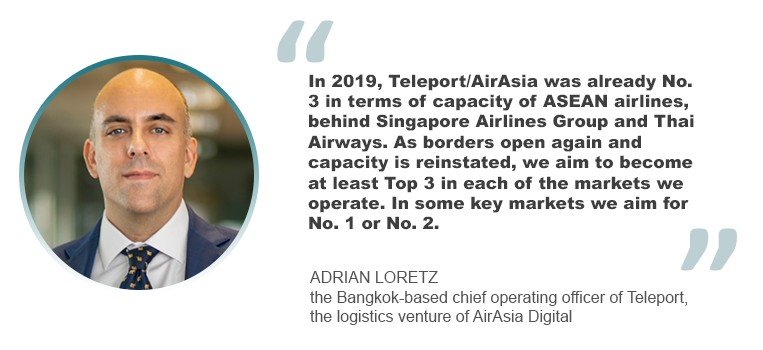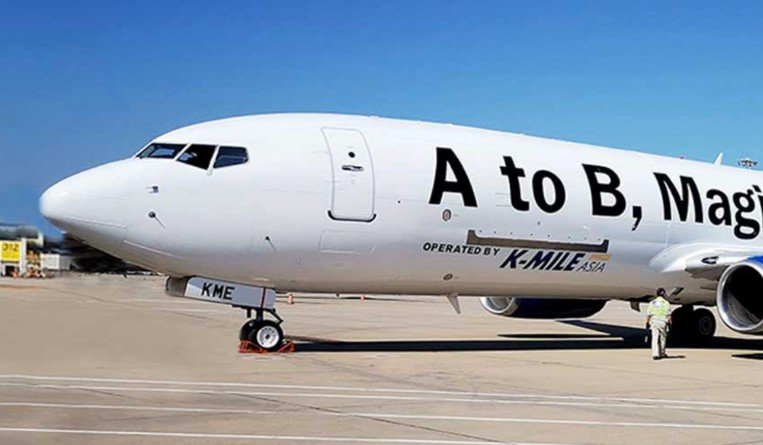Teleport, the logistics venture of AirAsia Digital, is looking to be a top cargo operator in the ASEAN region after recently beefing up its cargo play in the region with the launch of its own Boeing 737-800 dedicated freighter aircraft.
Teleport noted that since the start of 2020, it has set out to build a cargo-only network across the key air cargo lanes in the region to support the surge in ecommerce and general cargo demand which was further accelerated by the pandemic.
It currently has an active fleet of 252 planes (including AirAsia Group’s passenger planes), which it said will enable the carrier to offer “greater consistent capacity” on key air cargo routes across Southeast Asia.
“In 2019, Teleport/AirAsia was already No. 3 in terms of capacity of ASEAN airlines, behind Singapore Airlines Group and Thai Airways,” Adrian Loretz, the Bangkok-based chief operating officer of Teleport, told Asia Cargo News.

ASEAN consists of 10 Southeast Asian countries: Brunei, Cambodia, Indonesia, Laos, Malaysia, Myanmar, the Philippines, Singapore, Thailand and Vietnam.
“As borders open again and capacity is reinstated again in the different markets, we aim to become at least Top 3 in each of the markets we operate. In some key markets we aim for No. 1 or No. 2,” Loretz said.
The Teleport chief noted that the pandemic “has been good for Teleport” with the opportunity to provide much-needed capacity in the market when many airlines were grounded.
“Like other businesses, it was definitely not easy in the beginning. The challenges to pivot the business from a belly-only business to running freighters and charters was a challenge; however, it has equipped us to play a bigger role going forward.” Loretz said.
“As Teleport, we can sell across multiple markets and have no less than four home markets where we can play a dominant role,” he added, citing its hubs in key ASEAN cities of Bangkok, Kuala Lumpur, Manila and Jakarta to handle the region’s connectivity as well as transit cargo.
“This puts us in a unique position to offer a very dense network across most countries in Southeast Asia.”
More freighters planned
Following the launch of its dedicated 737-800 freighter and the unveiling of its livery earlier in November, Loretz told Asia Cargo News that the company plans to further expand its freight network and add more freighters as it remains “on the lookout” for opportunities to grow its cargo business.
“Our goal is to have six freighters by 2023 to start with,” Loretz said. “[This] will enable us to serve more routes as well.”
Aside from adding more dedicated freighters, Teleport also plans to grow its cargo operations by transporting cargo in the passenger cabins of planes idled by the coronavirus, using the Airbus A320 and A330 planes favoured by AirAsia’s passenger arm; expanding its core hubs from two to four (Bangkok, Kuala Lumpur, Manila and Jakarta); and opening more routes to deliver cargo.
The Teleport chief said in terms of acquisitions, it “needs to make sense” and fit the company’s strategic shift from a pure air freight logistics provider to a complete multi-modal operator.
“There has been continuous growth in the past 18 months in the pandemic, and we are hopeful it's only going to keep growing,” Loretz added.
First mile to last mile service
Loretz cited the first-mile-to-last-mile delivery advantage of Teleport, plans which AirAsia CEO Tony Fernandes spoke of at CAPA Live in July 2021. “I want to be part of the whole logistics chain, from first mile, last mile and mid mile,” Fernandes said at the time, also revealing plans to get into “the warehouse game”and to be “a direct source to freight forwarders and be a freight forwarder ourselves.”
“We are offering seamless connectivity with a single airway bill,” Loretz told Asia Cargo News. “We are the only airline to have a complete connectivity from first mile to last mile in our services.”
As pandemic restrictions start to ease, Loretz said, Teleport will be able to cover “all of Asia” to deliver cargo with AirAsia’s passenger belly flights to 232 cities and 115 “unique routes” in the region.
Moving forward, the Teleport chief also sounded optimistic on the overall outlook of the cargo industry despite current capacity constraint issues and added congestion pressures.
“The overall outlook for cargo remains largely positive, however we still expect challenges as we go back from a cargo-only network to a passenger network,” he said, although he also noted that the challenge for 2022 will be to retain a steady network that is cost-competitive and able to address the capacity demand in the market.
Charlee C. Delavin



